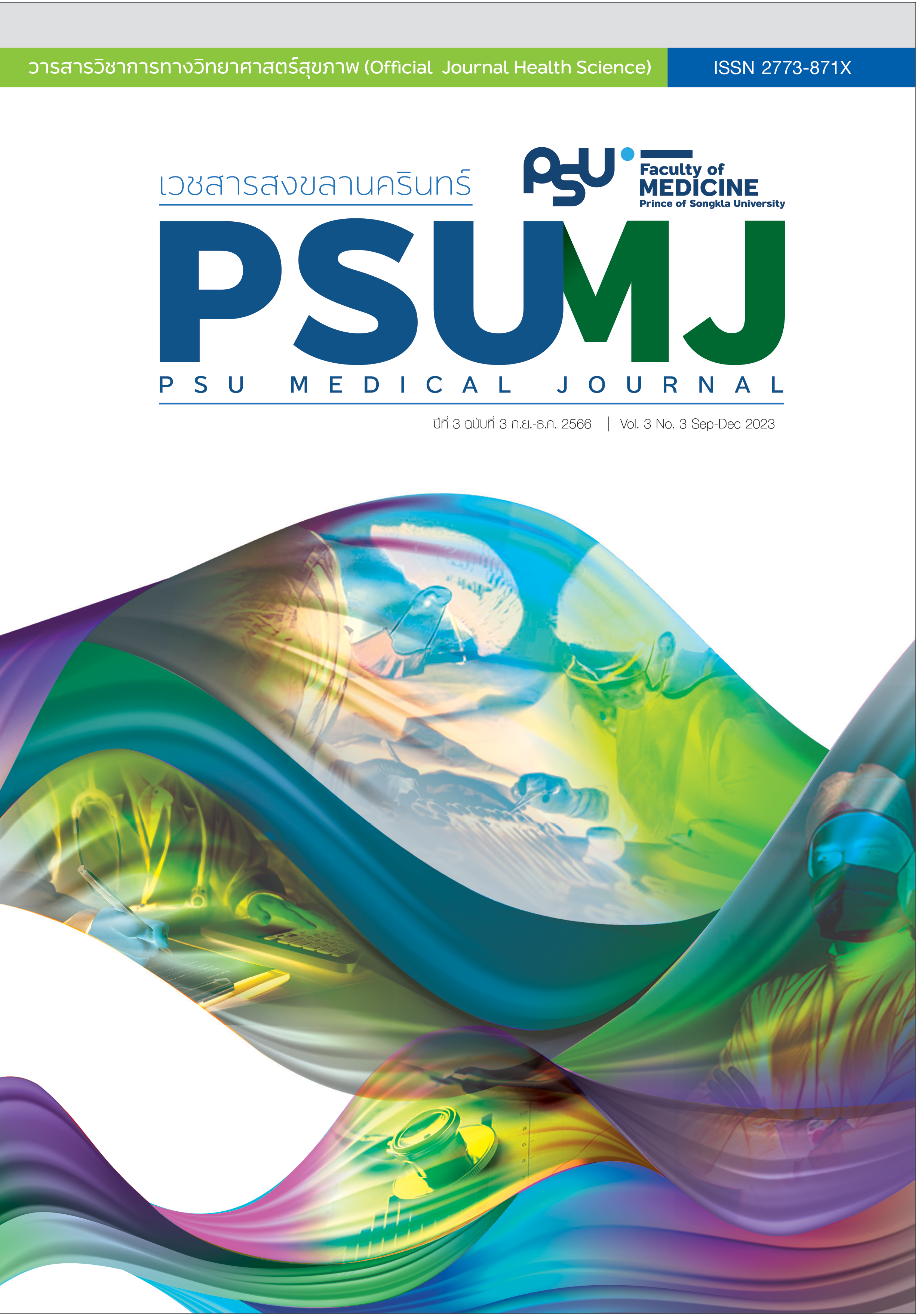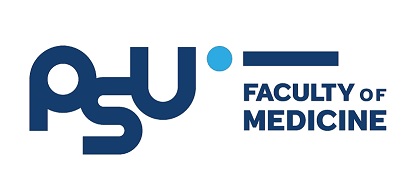The Role of Thai Local Herbs and Ingredients in Promoting Post-Pandemic Wellness and Medical Tourism for Sustainable Development Goal 3: A Critical Review of the Literature
DOI:
https://doi.org/10.31584/psumj.2023265031Keywords:
medical tourism, post-pandemic wellness, sustainable development, Thai local herbsAbstract
Objective: To investigate the therapeutic properties of local Thai herbs and ingredients, assess the scientific evidence on Thai traditional medicine, explore the cultural significance and traditional knowledge, analyze the potential of Thai herbs in post-pandemic wellness, and examine the role of Thai traditional medicine in medical tourism and its contribution to SDG 3.
Material and Methods: This article presents a comprehensive and rigorous critical review of the literature conducted systematically, including thorough data extraction, systematic search, and analysis of relevant studies.
Results: The literature review explores the results of various studies on the efficacy and safety of local Thai herbs and ingredients and the potential impacts of medical tourism on sustainability. The review reveals that Thai traditional medicine, incorporating practices, demonstrates promising therapeutic benefits for conditions such as inflammation and respiratory infections. However, challenges exist in terms of standardization and regulation, necessitating further research in order to establish safety and efficacy. While medical tourism benefits Thailand economically, concerns arise regarding social inequalities and environmental impacts. Integrating traditional medicine into medical tourism and adopting sustainable practices can mitigate any adverse effects. These findings highlight the importance of investments in research, education, technology, and sustainable tourism practices that promote traditional medicine, enhance patient care, and position Thailand as a leader in post-pandemic wellness and sustainable development.
Conclusion: The discussion emphasizes the need for continued research, education, and regulation in order to promote the integration of traditional medicine into the healthcare system, enhance the safety and efficacy of its practices, and position Thailand as a leader in medical tourism and post-pandemic wellness.
References
Cheewakriangkrai C, Pothacharoen P, Sriboonlue P. Effects of Thai herbal compresses containing curcuma longa, zingiber officinale, and alpinia galanga on pain, physical function, and quality of life in patients with knee osteoarthritis. Evid Based Complement Alternat Med 2020;1-7.
Saruwatari J, Nakamoto M, Makino I, Enomoto T. Effect of Thai herbal tea on respiratory symptoms of Japanese school children: a randomized controlled trial. Evid Based Complement Alternat Med 2020;1-9.
Tourism Authority of Thailand [homepage on the Internet]. Bangkok: Medical Tourism; 2021 [cited 2023]. Available from https://www.tourismthailand.org/Medical-Tourism
Shehzad A, Rehman G, Lee YS. Curcumin in inflammatory diseases. Biofactors 2013;39:69-77.
Grzanna R, Lindmark L, Frondoza CG. Ginger—An herbal medicinal product with broad anti-inflammatory actions. J Med Food 2005;8:125-32.
Luqman S, Dwivedi GR. Antimicrobial activity of essential oils from the leaves of cinnamomum spp. Nat Prod Res 2010;24: 595-601.
Phumthum M, Sitthinamsuwan P, Thanasilp S, Thamlikitkul V, Thinkhamrop B. Efficacy of Thai herbal formulation (Ya-Hom) for symptomatic treatment of respiratory tract infections. J Tradit Complement Med 2019;9:213-8.
Kampangkaew J, Sirichaiwetchakoon K, Srimuang K, Teerapong T. The effects of Thai Tom Yum Kung soup ingredients on immune response enhancement in vivo. Food Sci Technol Int 2020;26:161-71.
Panpetch W, Somboonwong J, Sirichaiwetchakoon K. Effect of a Thai herbal supplement on knee osteoarthritis. J Evid Based Integr Med 2019;24:2515690X1986726.
Ruangsang P, Bunchorntavakul C, Torsit T. A systematic review of anti-inflammatory activity of citral in animal models. Open Access J Med Aromat Plants 2020;1:41-9.
Luqman S, Dwivedi GR. Chemical composition of the essential oils of citrus sinensis cv. red common and citrus aurantifolia cv. kaghzi from Uttarakhand, India. Open Access J Med Aromat Plants 2010;1:23-8.
Pham-Huy LA, He H, Pham-Huy C. Free radicals, antioxidants in disease and health. Int J Biomed Sci 2008;4:89-96.
Jiratchariyakul W, Wiwat C, Kunanusorn P, Singhto N. Antioxidant and anti-inflammatory activities of sweet basil oil. Chiang Mai J Sci 2020;47:609-21.
Kuptniratsaikul V, Thanakhumtorn S, Chinswangwatanakul P, Wattanamongkonsil L, Thamlikitkul V. Efficacy and safety of Curcuma domestica extracts compared with ibuprofen in patients with knee osteoarthritis: a multicenter study. Clin Interv Aging 2014;9:451-8.
Park MJ, Gwak JH, Yang I, Song T, Lee M. Anti-proliferative effects of essential oil from Thai galanga (Alpinia galanga Linn.) on human colon adenocarcinoma cells. Food Sci Biotechnol 2016;25:301-6.
Prommee P, Jaroenporn S, Sirithunyalug B, Kuptniratsaikul S, Tantranont K. Thai herbal compress: A randomized double-blinded placebo-controlled trial in patients with knee osteoarthritis. J Tradit Complement Med 2021;11:63-9.
Promkhatkaew D, Chotepudsa P, Chiranthanut N. Efficacy of a Thai herbal formulation in patients with dyspepsia: A randomized controlled trial. Complement Ther Med 2019;44:295-301.
Prompinit P, Wiwanitkit V, Praipaksin N. The effects of Thai traditional medicine, Yahom, on upper respiratory tract infections: A randomized controlled trial. Evid Based Complement Alternat Med 2020;3782761.
Taneepanichskul N, Khorasanchi W, Thaimongkolnawin N, Swatdipong A, Manmee C, Puangpanngam K, Jirakasem C. The efficacy of traditional Thai massage in decreasing pain intensity in patients with musculoskeletal disorders: A systematic review of randomized clinical trials. Complement Ther Med 2015;23:330-43.
Chailert P, Likhitsathian S, Sriprasert I. Thai traditional medicine: A systematic review of its evidence base for specific indications. J Evid Based Integr Med 2019;24:2515690X19889210.
Suwansirikul N, Thanasilp S, Koontanaporn S, Sangkaew N. Efficacy of Thai herbal compresses for the prevention of pressure ulcers in hospitalized patients: A randomized controlled trial. J Clin Nurs 2020;23:1237-44.
Pramyothin P, Janthasoot W, Pongnorasak L, Kongtawelert P. Hepatoprotective effect of Thai herbal recipe “Khai Maengda” against paracetamol-induced liver toxicity in rats. J Ethnopharmacology 2013;146:850-7.
Wilasrusmee C, Kittur S, Siddiqui J, Bruch D, Wilasrusmee S, Kittur DS. Anticancer activity of natural products used in traditional Thai medicine. J Ethnopharmacol 2004;90:33-8.
Chantaratsamon P, Lourith N, Leelapornpisid P. Clinical efficacy of Thai herbal essential oils on acne treatment. J Cosmet Dermatol 2017;16:372-7.
Jiratchariyakul W, Wongpoomchai R, Phansuwan-Pujito P. Antioxidant and anti-inflammatory effects of sweet basil essential oil on lipopolysaccharide-induced inflammation in RAW264.7 macrophages. J Tradit Complement Med 2020;10:370-6.
Park MJ, Gwak JH, ChoM, Song KS, Kim JH, Yun HI. Evaluation of antibacterial activity of galangal (Alpinia galanga Linn.) essential oils against Vibrio spp. Food Control 2016;73:349-54.
Phumthum M, Narkkhong NA, Pothacharoen P, Chomnawang MT. Efficacy of Ya-Hom, a traditional Thai herbal formulation, in the treatment of respiratory tract infections: A randomized controlled trial. J Integr Med 2019;17:29-34.
Prommee P, Sricharoen P, Kamkaen N. Effects of Thai herbal compress in patients with knee osteoarthritis: A randomized controlled trial. Complement Ther Med 2021;59:102730.
World Health Organization. Health workforce requirements for universal health coverage and the sustainable development goals. [homepage on the Internet]. Geneva: WHO; 2020 [cited 2023]. Available from: https://www.who.int/hrh/resources/health-observer24/en/
Phumthum M, Sripanidkulchai B, Benmart Y. Anti-inflammatory and antioxidant activities of polyherbal formula AAVJLD in inflammation-induced osteoarthritis rats. Evid Based Complement Alternat Med 2019;1-13.
Taneepanichskul S, Worasutr S, Sricharoen P, Phuakpet W, Pensri P, Pattapong N. Effects of traditional Thai massage versus joint mobilization on substance P and pain perception in patients with nonspecific low back pain. J Phys Ther Sci 2015;27:3729-32.
Suwannakote S, Sae-Jung S, Sae-Tang C. In-person and online training in Thai traditional medicine: a comparison of knowledge acquisition and skill development. Integr Med Res 2018;7:175-9.
Wibulpolprasert S. Traditional and complementary medicine in Thailand: policy and implementation. World Health Organization South-East Asia. J Public Health 2017;6:6-9.
Chainani-Wu N. Safety and anti-inflammatory activity of curcumin: a component of tumeric (Curcuma longa). J Altern Complement Med 2003;9:161-8.
Jantarat C, Sirithunyalug J, Louthrenoo O, Kasetsinsombat K, Charoenkwan P. Anti-inflammatory effect of citrus hystrix essential oil on rat paw edema induced by carrageenan. Phytomedicine 2014;21:1303-7.
Chomnawang MT, Surassmo S, Nukoolkarn VS, Gritsanapan W. Antiviral activity of Tom Yum Kung recipe extract against influenza viruses. J Tradit Complement Med 2019;9:53-7.
Taweechaisupapong S, Singhara S, Lertsatitthanakorn P, Khunkitti W, Thunyaharn S. In vitro antimicrobial activity of Thai herbal remedies against bacteria causing dental caries. J Med Plant Res 2006;1:85-98.
Singh D, Narayanan S, Vicknasingam B. Traditional and non-traditional uses of Mitragyna speciosa (kratom): a survey of the literature. Brain Res Bull 2014;126:41-6.
Guan Y. The development of traditional Chinese medicine in the healthcare system of China. J Integr Complement Med 2017;23:163-6.
Zhang B, Wang H, Wang X, Wang J, Xu D, Li Y. The integration of traditional Chinese medicine into modern medicine in China. J Altern Complement Med 2018;24:658-62.
Kim KH, Kang JW, Lee MS, Lee JD, Nam DW, Kim AR. Current practices in traditional Korean medicine: a national survey of licensed Korean medicine doctors in the management of low back pain. BMC Complement Altern Med 2016;16:1-9.
Kim KH, Kang JW, Lee MS, Lee JD, Nam DW, Kim AR. Satisfaction of patients who visited traditional Korean medicine clinics: a prospective observational pilot study. BMC Complement Altern Med 2017;17:1-8.
Vishnu N, Panniyammakal J, Shenoy S. Traditional medicine in India and integration with modern medicine for patient benefit. J Altern Complement Med 2017;23:792-9.
Joshi K, Ghildiyal S, Anand A, Arya R. Ayurveda: A traditional system of medicine in India. Int J Ayurveda Res 2013;4:161-6.
Downloads
Published
How to Cite
Issue
Section
License
Copyright (c) 2023 Author and Journal

This work is licensed under a Creative Commons Attribution-NonCommercial-NoDerivatives 4.0 International License.








